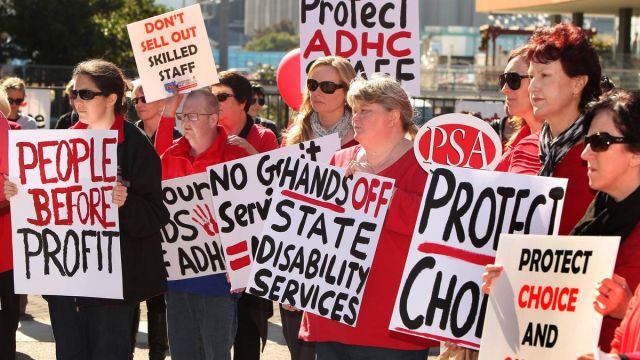
Under the cover of Christmas, 10 peak representative bodies of people with disability were defunded by the federal government.
Hang on, how does that work? Is this government not rolling out the National Disability Insurance Scheme (NDIS) that seeks to consult widely with people with disabilities and their advocates? Is this not the promise of a new arena of flexibility and choice, a “consumer-led” initiative that puts disability rights and voice front and centre?
Former Disability Discrimination Commissioner, Graeme Innes recently described last year as an annus horribilis for people with disability.
First, the position of Disability Discrimination Commissioner was axed, and then the ABC’s disability portal “Ramp Up” was cut.
The assault on Medicare continues to threaten people with disability more than most as those with high medical needs need to see a doctor more often.
Efforts to force people off the Disability Support Pension and onto Newstart continued without any corresponding plan to encourage or provide jobs for people with disability. And to cap it all, organisations that reflect the voice of people with disability have now been defunded.
The 10 organisations — most of which will run out of funds next month — represent people with intellectual disability, autism, brain injury, blindness, deafness and physical disability.
Some speculate that the government carefully selected some of its key detractors. Over the course of 2013/14, Inclusion Australia (formerly known as the National Council for Intellectual Disability) waged a sustained campaign for a more equitable wages system for people with intellectual disability.
People with intellectual disability constitute 70% of those accessing NDIS and there has been a lot of talk about improving social and economic participation of this sector of the community. Again, one must ask: does it help the cause to axe the key national advocacy organisation that seeks to inform government policy on these matters?
What did the government save in this bold strike? Just $1.5 million a year.
It can’t be said this was the cause of the “budget blowout” that we keep hearing so much about. No, it would seem the cuts go deeper than that.
This cut to disability services was part of an overall $271 million cut from the Department of Social Services Discretionary Grants Program over the next four years.
The Grants Program was open to a competitive tender process and more than 5500 new and existing charities and service providers applied. Only 700 have been shortlisted as preferred providers and negotiations are yet to be finalised around who gets what.
We do, however, know those who were unsuccessful. Others axed include family services, housing services and emergency relief.
The Australian Federation of Disability Organisations is seeking a meeting with new social services minister Scott Morrison and is pushing for a Senate inquiry into the process that resulted in these organisations losing their funding. Several organisations have indicated that they will struggle on — albeit in a voluntary capacity — but why should they have to do cake stalls and sausage sizzles to ensure the voice of people with disability, in all its diversity, is heard?
If last year was a terrible year, what is in store this year with the former immigration minister Scott Morrison, the driver of the inhumane “stop the boats” crusade now in the social services portfolio?
The protest at the ongoing assault by this government must be joined by the disability sector.
Disability rights campaigners must be part of a concerted cross-sectoral response — with unions, disability peak bodies and those they represent, charitable organisations, emergency and housing services banding together.
A broad community campaign can force a reversal of these retrograde decisions. Keeping their heads down for fear of alienating future engagement with government around the roll out of NDIS will only weaken the capacity of disability services to influence the shape of future disability services, supports and advocacy.
[Janet Parker works in the disability sector in Western Australia.]
Read more: I’m in my 20s but had to spend four months in aged care because there was 'nowhere else to go'
Like the article? Subscribe to Green Left now! You can also like us on Facebook and follow us on Twitter.